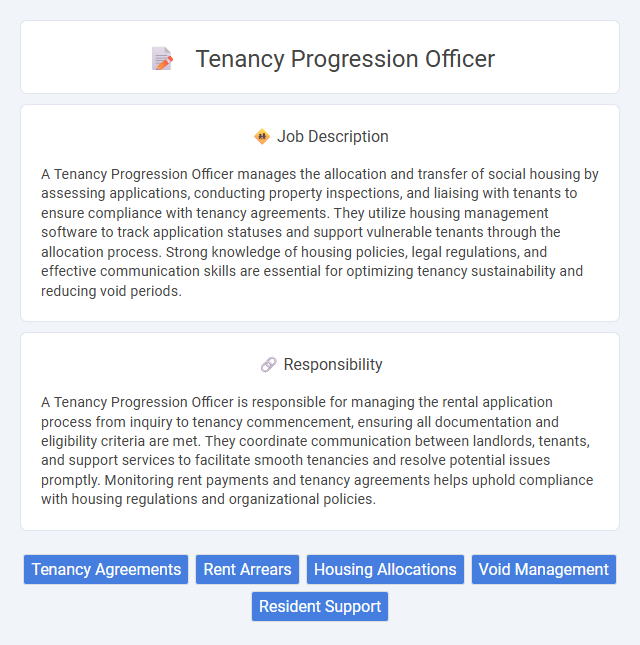
A Tenancy Progression Officer manages the allocation and transfer of social housing by assessing applications, conducting property inspections, and liaising with tenants to ensure compliance with tenancy agreements. They utilize housing management software to track application statuses and support vulnerable tenants through the allocation process. Strong knowledge of housing policies, legal regulations, and effective communication skills are essential for optimizing tenancy sustainability and reducing void periods.
Individuals with strong communication skills and a calm, empathetic demeanor are likely to be well-suited for a Tenancy Progression Officer role. Candidates who can manage stressful situations and navigate complex tenant-landlord relationships may find this job fitting. Those lacking patience or conflict resolution abilities might struggle to meet the demands of this position.
Qualification
A Tenancy Progression Officer typically holds a qualification in housing, social work, or a related field such as public administration or community development. Professional certifications like the Chartered Institute of Housing (CIH) Level 3 or 4 are highly valued for demonstrating expertise in housing management and tenancy support. Strong knowledge of housing laws, tenant rights, and experience in customer service are essential qualifications for effectively supporting residents through the tenancy process.
Responsibility
A Tenancy Progression Officer is responsible for managing the rental application process from inquiry to tenancy commencement, ensuring all documentation and eligibility criteria are met. They coordinate communication between landlords, tenants, and support services to facilitate smooth tenancies and resolve potential issues promptly. Monitoring rent payments and tenancy agreements helps uphold compliance with housing regulations and organizational policies.
Benefit
The role of a Tenancy Progression Officer likely offers significant benefits such as enhancing communication skills through regular tenant interactions and improving organizational abilities by managing tenancy documentation. There is a strong probability that this position also provides a rewarding sense of contributing to community stability and housing solutions. Career growth prospects may be present due to the role's involvement in housing management and tenant support services.
Challenge
Tenancy progression officers likely face challenges related to managing a high volume of cases while ensuring compliance with housing regulations and tenancy agreements. The complexity of coordinating between tenants, landlords, and support services may increase the difficulty of timely and effective tenancy progression. Balancing the needs and expectations of all parties involved often requires strong problem-solving skills and resilience under pressure.
Career Advancement
Tenancy progression officers play a crucial role in managing rental agreements, ensuring smooth tenant onboarding, and resolving housing issues, which provides a strong foundation for career growth in housing management. Developing expertise in tenant liaison, housing legislation, and conflict resolution can lead to advancement opportunities such as senior tenancy officer, housing manager, or roles in property development. Mastery of digital housing management systems and excellent communication skills enhances prospects for leadership positions within social housing organizations.
Key Terms
Tenancy Agreements
A Tenancy Progression Officer specializes in managing and finalizing tenancy agreements to ensure clarity and compliance with housing regulations. They coordinate with prospective tenants to complete documentation, verify eligibility, and address any queries related to lease terms and obligations. Efficient handling of tenancy agreements accelerates the move-in process and supports sustainable tenancy management.
Rent Arrears
A Tenancy Progression Officer specializing in rent arrears manages overdue payments through timely interventions and personalized support plans. They utilize data analytics to identify high-risk tenants, ensuring targeted communication and efficient arrears recovery. Their role is critical in maintaining financial stability within housing portfolios and minimizing eviction rates.
Housing Allocations
A Tenancy Progression Officer specializing in Housing Allocations manages the efficient allocation of social housing units, ensuring compliance with local authority policies and housing regulations. This role involves assessing applicant eligibility, coordinating offers, and facilitating smooth tenant move-ins to maximize occupancy rates and reduce void periods. Expertise in housing management systems and relevant legislation is critical for optimizing allocation processes and supporting community housing objectives.
Void Management
Tenancy Progression Officers play a critical role in void management by coordinating the efficient re-letting of vacant properties to minimize rent loss. They manage inspection processes, liaise with contractors for repairs, and ensure compliance with housing regulations to prepare properties swiftly for new tenants. Effective void management by these officers directly contributes to improved occupancy rates and maximized rental income for housing providers.
Resident Support
A Tenancy Progression Officer plays a crucial role in Resident Support by assisting tenants in understanding their tenancy agreements and resolving housing-related issues. They provide tailored guidance to ensure residents maintain stable tenancies and access relevant support services such as financial advice and dispute resolution. Effective communication and coordination with housing teams improve overall tenant satisfaction and community well-being.
 kuljobs.com
kuljobs.com